The best liquid for protein shakes is becoming increasingly popular among fitness enthusiasts, athletes, and those who want to supplement their diet with a nutritious dense drink.
Whether you consume them as the main part of your meal or just need an extra boost of nutrients during your day, finding the perfect liquid for protein shakes can be difficult. From kinds of milk to juices to water, each option brings its own unique benefits that can make all the difference when you’re trying to achieve your health and wellness goals.
In this post, we explore different liquids for protein shakes and uncover which ones could work best for you!
Table of Contents
What is a Protein Shake and Why Do You Need One
- Protein shakes are beverage drinks enriched with protein, often consumed to supplement protein intake in one’s diet.
- They can serve as a meal replacement or a post-workout drink to aid muscle recovery and growth.
- Protein shakes can also aid in weight loss by curbing hunger and boosting metabolism.
- They are particularly beneficial for individuals who have increased protein needs, like athletes and bodybuilders.
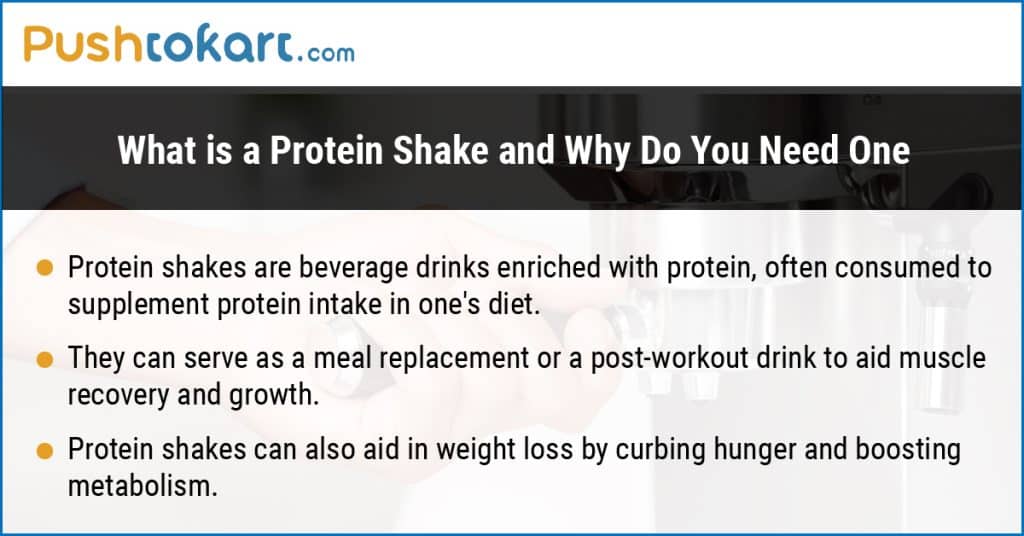
Exploring the Different Types of Liquid for Protein Shakes
- Water is a no-calorie option for mixing protein shakes, best suited for those looking to lose weight.
- Milk (both dairy and plant-based) is a popular choice, providing additional protein and enhancing the taste and texture of the shake.
- Dairy-based alternatives like yogurt can add thickness and richness to protein shakes, along with probiotics for gut health.
- Plant-based options like almond milk, soy milk, and coconut water offer various benefits such as lower calories, and added nutrients, and are a great option for those with lactose intolerance.
- Some people also use juice for a fruity flavor, but it’s important to choose 100% fruit juice to avoid added sugars.
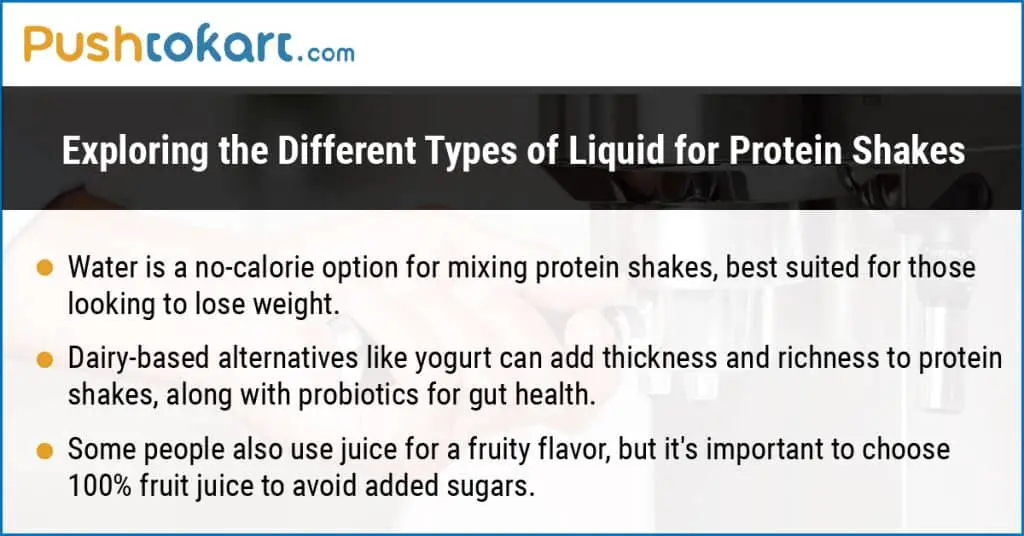
Benefits of Using Milk for Protein Shakes
- Milk, whether it’s whole, skim, or low-fat, offers additional protein, which can aid in muscle recovery and growth.
- The natural sugars found in milk can provide a quick energy source post-workout.
- Milk contains essential nutrients like calcium and vitamin D, which support bone health.
- Using milk can enhance the creaminess and flavor of the protein shake, making it more enjoyable to drink.
Exploring Other Dairy-Based Alternatives
- Yogurt, especially Greek yogurt, is a great dairy alternative that adds thickness and creaminess to the protein shake while boosting its protein content.
- Kefir, a fermented dairy product, can serve as a base for protein shakes, adding a tangy flavor, and beneficial probiotics to support gut health.
- Cottage Cheese can be blended into a shake to provide a thick, rich texture and an extra dose of protein.
- Buttermilk, with its tangy flavor and light consistency, can be a refreshing base for a protein shake, especially during the summer months.

Evaluating Plant-Based Options
- Almond milk is a low-calorie, dairy-free alternative that is also rich in vitamin E and calcium. Its mild flavor and creamy consistency make it a popular choice for protein shakes.
- Soy milk offers a plant-based alternative that is high in protein and fortified with vitamins and minerals. It’s a great choice for vegans or those with lactose intolerance.
- Coconut water is naturally hydrating and rich in potassium, making it an excellent choice for post-workout recovery shakes. It adds a mildly sweet and nutty flavor to shakes.
- Rice milk is a hypoallergenic option, suitable for those with nut or soy allergies. It has a naturally sweet flavor but is low in protein, so it’s best used in combination with high-protein ingredients.
- Oat milk is a creamier plant-based alternative, rich in fiber and free from nuts, making it a good option for those with specific dietary requirements. It has a slightly sweet and oaty flavor that works well in various shake recipes.
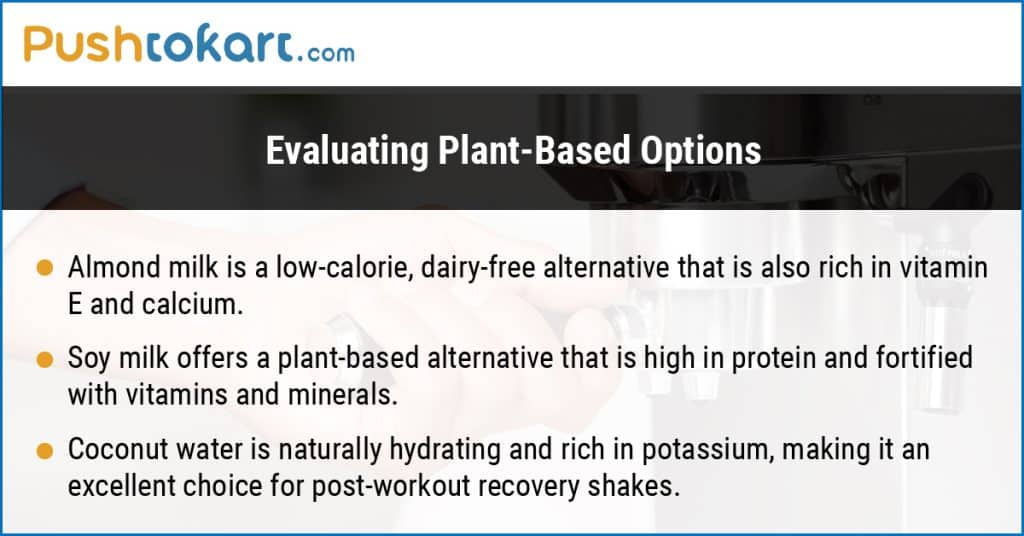
What to Look For When Choosing a Liquid For Your Protein Shake
- Nutritional Content: Examine the nutritional values of the liquid base you are considering. Look for a good balance of proteins, carbs, and healthy fats, along with essential vitamins and minerals.
- Dietary Restrictions: If you have specific dietary needs or restrictions such as lactose intolerance, veganism, or allergies, ensure the liquid base you choose fits your diet.
- Caloric Value: If weight management is a goal, the caloric value of the liquid base is important. Options like water, unsweetened almond milk, or coconut water are low in calories.
- Taste and Texture: The flavor and consistency of the liquid base will greatly impact the overall taste and feel of your protein shake. Try different options to find one that you enjoy.
- Cost and Availability: Some liquid bases, especially certain plant-based milks, can be more expensive or more difficult to find. Choose an option that fits your budget and can be easily purchased from your local grocery store.
- Health Benefits: Some liquids come with added health benefits. For instance, almond milk is enriched with vitamin E, an antioxidant, and coconut water is known for its hydrating properties.

The Best Liquids to Mix Your Protein Powder Into
Whether you’re a fitness enthusiast or adopting a healthier lifestyle, protein shakes can be a great way to supplement your diet. But, are you tired of mixing your protein powder with just water? Here are some innovative alternatives that can enhance the taste and nutritional value of your shakes.
Firstly, consider mixing your protein powder into milk. Skimmed, semi-skimmed, soy, almond, or oat milk are all viable choices. Not only does milk add creaminess and a pleasant taste, but it also provides additional protein and calcium.
Next is fruit juice. A protein shake combined with 100% juice like orange, apple, or pineapple can be a refreshing post-workout drink. It’s a great way to replenish your body’s sugar levels, along with providing essential vitamins and minerals.
If you prefer a more filling option, a smoothie could be the answer. Combine your protein powder with a blend of fruits, vegetables, and a liquid base like yogurt or almond milk. This concoction can serve as a complete meal, ticking off multiple nutritional requirements at once.
Lastly, for coffee enthusiasts, why not mix your protein powder into your morning cup of joe? This could serve as an excellent breakfast option, giving you a protein boost along with your much-needed caffeine kick.
By experimenting with these different liquids, not only will your protein shakes become more enjoyable, but they will also align more closely with your dietary and nutritional needs.
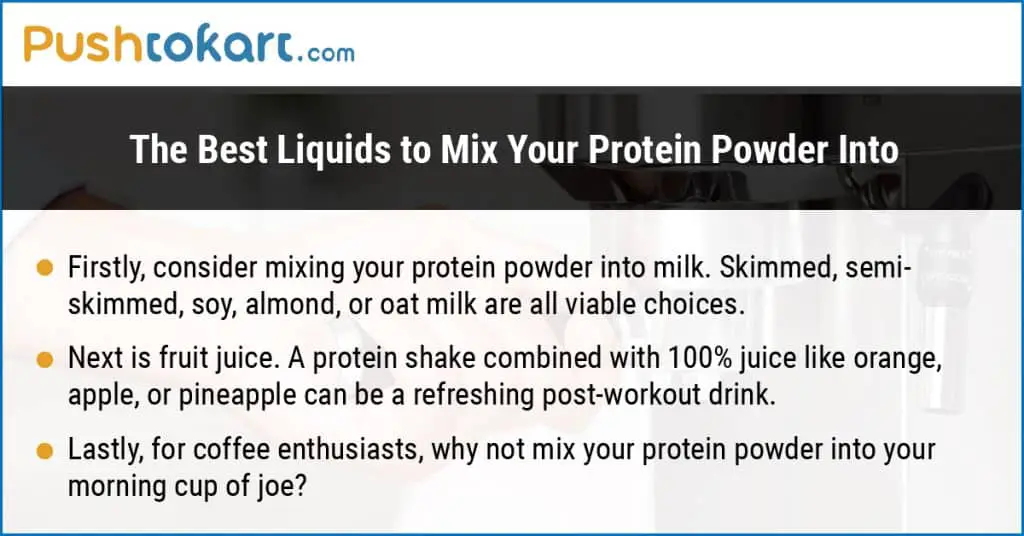
Conclusion
What is the best liquid for protein shakes?
In conclusion, the choice of liquid for your protein shake depends largely on your unique nutritional needs, dietary restrictions, taste preferences, and wellness goals.
From calorie-free water to nutrient-rich milk; from creamy, probiotic-packed yogurt to a plethora of plant-based options, there’s a suitable choice for everyone. The key is to experiment with different liquids to find the one that not only enhances the taste and texture of your shake but also aligns with your health objectives.
Always remember to check the nutritional content, consider any dietary restrictions, weigh the caloric value, assess taste and texture, evaluate cost and availability, and consider the unique health benefits of each option before making your choice. Ultimately, the perfect liquid base for your protein shake is the one that makes your journey toward health and wellness both enjoyable and effective.
FAQs
What is the best liquid to mix with a protein shake?
There isn’t a ‘best’ option universally as it largely depends on individual dietary needs, taste preferences, and health goals. However, commonly used options include water, dairy, or plant-based milk, yogurt, kefir, and fruit juice.
Is it okay to mix protein powder with water?
Yes, it’s perfectly fine. Water is a no-calorie option that won’t alter the taste of the protein powder. It’s a good option for those looking to lose weight or reduce calorie intake.
Is milk or water better for protein shakes?
Again, it depends on individual goals and preferences. Milk adds extra protein and nutrients and enhances the shake’s taste and texture. Water, on the other hand, is a no-calorie option that won’t interfere with the protein powder’s flavor.

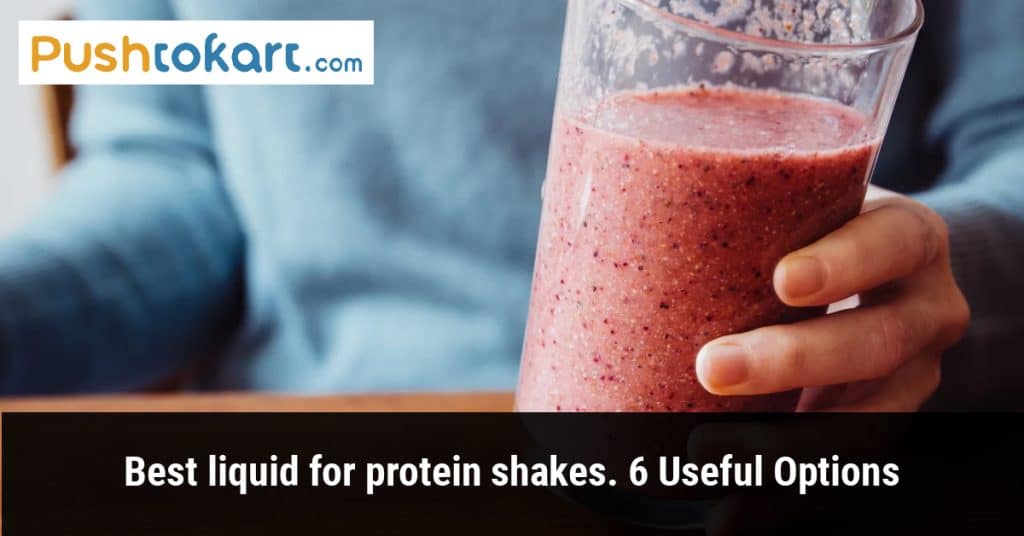
Pingback: Best protein shakes for soccer players. 4 Best Types - Pushtokart